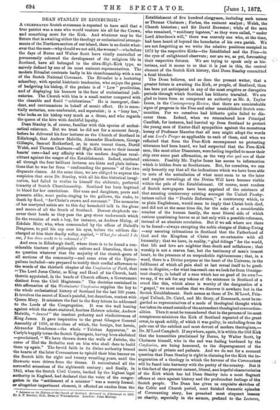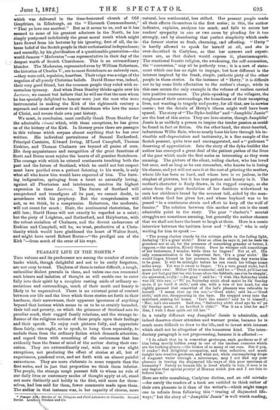DEAN STANLEY IN EDINBURGH.*
A CELEBRATED Scotch statesman is reported to have said that a true patriot was a man who would venture his all for the Crown, -and something more for the Kirk. And whatever may be the future that is awaiting either the theology or ecclesiastical arrange- ments of the Northern section of our island, there is no doubt what- ever that the men—why should we not add, the wornen?—who before the days of Burns and Walter Scott have vitally controlled or permanently coloured the development of the religious life in Scotland, have all belonged to the ultra-High-Kirk type, so suavely defined by one of its most eminent representatives. The modern Ritualist contrasts badly in his churchmanship with a son of the Scotch National Covenant. The Ritualist is a hectoring schoolboy, with special histrionic tendencies, who enjoys the game -of badgering his bishop, if the prelate is of " Low " proclivities, and of displaying his banners in the face of ecclesiastical judi- catories. The Church with him is a small matter compared with the chasuble and florid "celebrations." He is insurgent, dissi- -dent, and contumacious in behalf of scenic effect. He is essen- tially sectarian, non-conformist, and separatist ; is a "busy bee," who looks on his bishop very much as a drone, and who regards 'the queen of the hive with doubtful loyalty.
Dean Stanley is, of course, familiar with this species of ecclesi- astical existence. But we trust he did not for a moment fancy, before he delivered his four lectures on the Church of Scotland in Edinburgh, that Andrew Melville, Alexander Henderson, George ,Gillespie, Samuel Rutherfurd, or, in more recent times, David Welsh, and Thomas Chalmers—all High-Kirk men to their inmost hearts' core—had any affinity with the modern Anglican recal- citrant against the usages of the Establishment. Indeed, scattered all through the four brilliant lectures are hints and plain intima- tions that he was far from " confounding the persons" of the two disparate classes. At the same time, we are obliged to express the suspicion that even Dr. Stanley, with all his fine historical imagi- nation, had failed to realise to himself the obdurate, perfervid tenacity of Scotch Churchrnanship. Scotland has been baptised in blood for her convictions. Her sons and daughters, peers and peasants alike, went psalm-singing to the gallows, the stake, to death by flood, "for Christ's crown and covenant." The memories of her martyred saints are to this day household talk in the glens and moors of all the South of Scotland. Devout shepherds un- cover their heads as they pass the grey stone underneath which lie the remains of such a boy, for instance, as Andrew Hislop, of Eskdale Muir, who, when commanded by the officer of Dalzell's Dragoons, to pull his cap over his eyes, before the soldiers dis- -charged at him their deadly volley, replied, " What for should I do sae, I hoe (loon nocht to be ashamed o' ?"
And even in Edinburgh itself, where there is to be found a con- siderable tincture of philosophic culture and liberalism, there is no question whatever that the majority of the church-goers of all sections of the community—and some even of the Episco- palians included—are prepared to testify their cordial adherence to the words of the thirtieth chapter of the Confession of Faith, that 4' The Lord Jesus Christ, as King and Head of his Church, hath therein appointed, in the hands of Church officers, a Government .distinct from the Civil Magistrate." The doctrine contained in this affirmation of the Westminster Confession supplies the key to the whole ecclesiastical history of Scotland for the last 300 years. It involves the secret of Knox's painful, but dauntless, contest with 'Queen Mary. It ministers the fuel to the fiery letters he addressed to the Lords of the Congregation. It was the wall leaning against which the short-statured, fearless Hebrew scholar, Andrew Melville, "daured " the insolent pedantry and vindictiveness of King James. It gave inspiration to the great Glasgow General Assembly of 1638, at the close of which, the benign, but heroic, Alexander Henderson—the whole " Tulchan Apparatus," as 'Carlyle happily terms the Scotch Episcopate, having been abolished —proclaimed, " We have thrown down the walls of Jericho, the curse of Hiel the Bethelite rest on him who shall dare to build them up again." The fervid faith in its divine authority braced the hearts of the later Covenanters to uphold their blue banner on the Scotch hills for eight and twenty wrestling years, until the Stewarts were driven from the throne. It necessitated all the sorrowful secessions of the eighteenth century ; and finally, in 1843, when the Scotch Civil Courts, backed by the highest legal authority in England, had declared that the voice of the congre- gation in the "settlement of a minister" was a merely formal, or altogether impertinent element, it effected an exodus from the * Lectures on Me History of the Church of Scotland, delivered in Edinburgh in 1872. By A. P. Stanley, D.D., Dean of Westminster. London: John Murray.
Establishment of five hundred clergymen, including such names as Thomas Chalmers ; Forbes, the eminent analyst ; Welsh, the Church historian ; and Sir David Brewster ; while of the men who remained, "residuary legatees," as they were called, "under Lord Aberdeen's will," there was scarcely one who, at the time, had been heard of beyond the boundaries of his own parish. We are not forgetting as we write the relative positions occupied in 1872 by the respective Kirks—the Established and the Free—in the eyes of enlightened observers ; nor are we, as yet, forecasting their respective futures. We are trying to speak only as his- torians, and it seems to us that it is just in this, the central element of the Scotch Kirk history, that Dean Stanley committed a fatal blunder.
which was delivered in the time-honoured church of Old Greyfriars, in Edinburgh, on the "Eleventh Commandment," "That ye love one another." But as it seems to us, and as it has seemed to some of his greatest admirers in the North, he has simply postponed indefinitely the great moral result which might have flowed from his lectures by his ignoring, first of all, the in- tense belief of the Scotch people in their ecclesiastical independence; and secondly, by his glorification of a questionable generation—the world-famous " Moderates "—as representative in their day of the 7 deepest worth of Scotch Churchmen. This is an extraordinary blunder. The Moderates, represented even by William Robertson, the historian of Charles V., are to most Scotchmen an unlovely race, —they were cold, repulsive, heartless. Their reign was a reign of the negation of all purely Christian beliefs. David Hume was, indeed, their very good friend, but the common people they ruled with re- morseless tyranny. And when Dean Stanley thinks again over his Lectures, we cannot but believe that he will see that the men whom he has specially delighted to honour were just the men who were instrumental in making the Kirk of the eighteenth century a reproach and cause of sorrow to all Scotchmen who love the name of Christ, and revere their own past history.
We must, in conclusion, most cordially thank Dean Stanley for the admirable raume" which, with these exceptions, he has given us of the history of the Kirk. In literary grace there are passages in this volume which surpass almost anything that he has ever written. His individual portraitures of Samuel Rutherford, Principal Carstairs, Edward Irving, M'Leod Campbell, Thomas Erskine, and Thomas Chalmers are beyond all praise of ours. His deep acquaintance and recognition of the great functions of Scott and Burns must rejoice the hearts of all genuine Scotchmen. The courage with which he uttered sentiments touching both the past and the future of Scotland, which he could not but suspect must have perilled even a patient listening to his words, is only what all who know him would have expected of him. The burn- ing indignation, springing from a heart so naturally loving, against all Pharisaism and intolerance, receives its highest expression in these Lectures. The future of Scotland will comprehend and transfigure all its past, we cannot doubt, in accordance with his prophecy. But the comprehension will not, as we think, be a compromise. Robertson, the moderate, will not count for much ; Blair, the sentimental rhetorician, for still less ; David Hume will not exactly be regarded as a saint ; but the piety of Leighton, and Rutherford, and Halyburton, with the robust socialism of Chalmers, and the devout endeavours of Erskine and Campbell, will be, we trust, productive of a Chris- tianity which would have gladdened the heart of Walter Scott, and might have saved Robert Burns—" the prodigal son of the Kirk "—from much of the error of his ways.



































 Previous page
Previous page